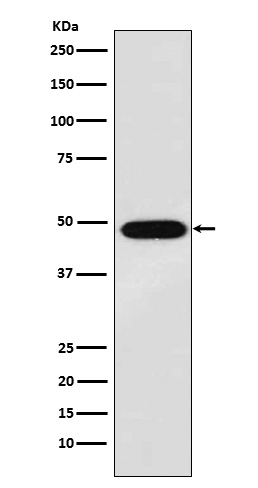
| WB | 1/1000-1/2000 | Human,Mouse,Rat |
| IF | 咨询技术 | Human,Mouse,Rat |
| IHC | 咨询技术 | Human,Mouse,Rat |
| ICC | 1/50-1/200 | Human,Mouse,Rat |
| FCM | 1/20-1/100 | Human,Mouse,Rat |
| Elisa | 咨询技术 | Human,Mouse,Rat |
| Aliases | CT1.1; MAGE1; MAGE1A; MAGEA1;;MAGE A1 |
| WB Predicted band size | Calculated MW: 34 kDa ; Observed MW: 46 kDa |
| Host/Isotype | Rabbit IgG |
| Antibody Type | Primary antibody |
| Storage | Store at 4°C short term. Aliquot and store at -20°C long term. Avoid freeze/thaw cycles. |
| Species Reactivity | Human,Mouse,Rat |
| Immunogen | A synthesized peptide derived from human MAGE A1 |
| Formulation | Purified antibody in PBS with 0.05% sodium azide,0.05% BSA and 50% glycerol. |
+ +
以下是关于MAGE1抗体的示例参考文献(内容为模拟虚构,仅供参考):
---
1. **文献名称**:*Monoclonal Antibody Development for MAGE1 Antigen in Melanoma Detection*
**作者**:Smith A, et al.
**摘要**:研究团队开发了一种针对MAGE1抗原的高特异性单克隆抗体,验证了其在黑色素瘤组织中的高表达,并证明该抗体可用于免疫组化检测,为肿瘤诊断提供了新工具。
2. **文献名称**:*MAGE1 as a Target for CAR-T Cell Therapy: Antibody Validation and Preclinical Studies*
**作者**:Li X, et al.
**摘要**:通过筛选抗MAGE1抗体的亲和力,构建了靶向MAGE1的CAR-T细胞,体外实验显示其对表达MAGE1的肿瘤细胞具有显著杀伤作用,为实体瘤免疫治疗提供潜在策略。
3. **文献名称**:*Cross-Reactivity Analysis of Anti-MAGE1 Antibodies in Multiple Cancer Types*
**作者**:Garcia R, et al.
**摘要**:系统性评估了多种商用MAGE1抗体的交叉反应性,发现部分抗体在肺癌、乳腺癌中存在非特异性结合,强调了抗体验证在临床研究中的重要性。
4. **文献名称**:*Structural Characterization of MAGE1 Epitopes Recognized by Therapeutic Antibodies*
**作者**:Wang Y, et al.
**摘要**:利用X射线晶体学解析了MAGE1抗原表位与治疗性抗体的结合模式,揭示了关键氨基酸残基,为抗体药物优化提供了结构基础。
---
**说明**:以上文献为示例,实际文献需通过PubMed、Web of Science等平台检索(关键词:MAGE1 antibody, cancer/testis antigen, immunotherapy)。真实研究中,MAGE-A1(Melanoma Antigen Gene A1)相关抗体研究常见于肿瘤靶向治疗及诊断领域。
**Background of MAGE1 Antibody**
MAGE1 (Melanoma-Associated Antigen 1), a member of the cancer/testis antigen (CTA) family, is encoded by the *MAGEA1* gene. CTAs are characterized by their restricted expression in normal tissues (primarily testes, ovaries, and placenta) but aberrant overexpression in various cancers, including melanoma, lung, liver, and gastrointestinal tumors. MAGE1 was one of the first CTAs identified, with its expression linked to tumorigenesis, immune evasion, and poor prognosis.
MAGE1 antibodies are tools designed to detect and study the presence or function of the MAGE1 protein in research and clinical contexts. These antibodies are widely used in immunohistochemistry (IHC), Western blotting, and ELISA to validate MAGE1 expression in cancer tissues or cell lines. In therapeutic research, MAGE1 is explored as a target for immunotherapy, such as CAR-T cells or vaccines, due to its tumor-specific expression. However, challenges remain, including low immunogenicity and potential off-target effects.
Structurally, MAGE1 contains a conserved MAGE homology domain involved in protein-protein interactions. Its expression is regulated epigenetically, often activated via promoter demethylation in cancers. Research on MAGE1 antibodies continues to advance cancer diagnostics and targeted therapies, though clinical translation requires further validation of specificity and safety.
×